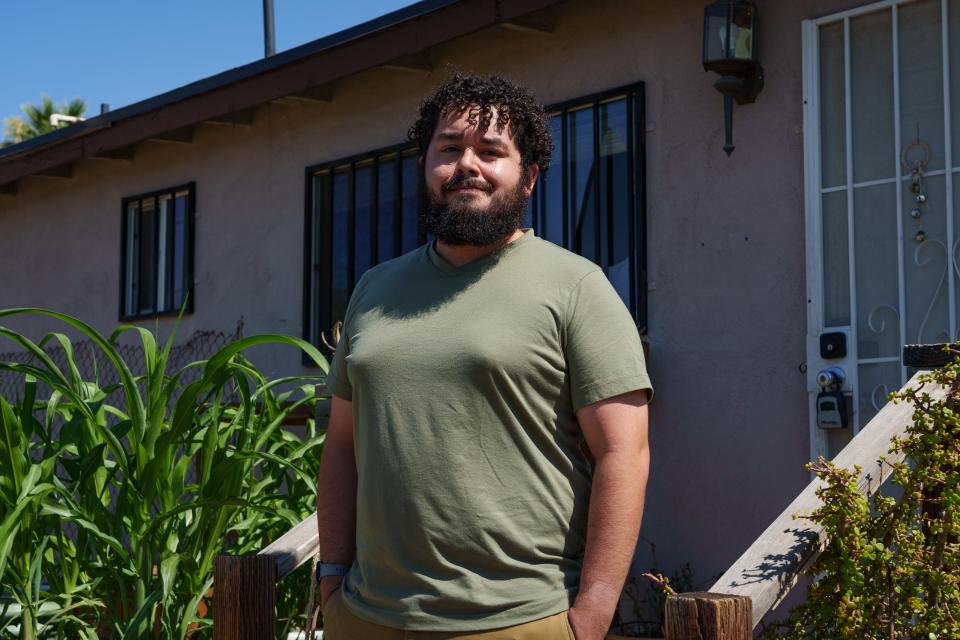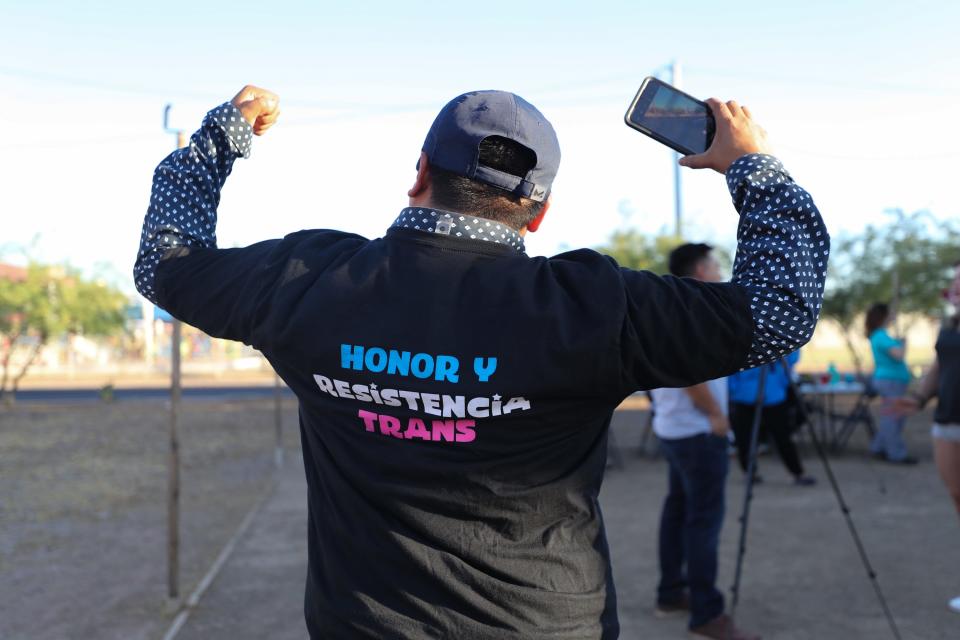'We had to create our own space': How LGBTQ organizations in Phoenix create community for Latinos
Hernan Villegas needed an out.
Despite being fully supported by his immediate family after coming out as gay, the 32-year-old moved to Arizona as a teenager in 2009 in search of a community that he could not find in the small town of Great Bend, Kansas.
Fortunately, he found his second family in Phoenix — but it took him years.
Having been outcasted for being gay by his extended family who lived in Arizona, and not having queer role models growing up, Villegas felt that he was on his own once in Phoenix and that “no one could possibly understand.”
He recalled growing up and feeling like he didn’t have a place — because while Villegas identifies as gay, he is also Mexican.
For those who exist in the intersection of being Latino and also part of the LGBTQ+ community, familial and community acceptance is often harder to come by, as well as resources needed to address identity and culture-specific concerns. Members of this community often find themselves having to hide their identity, struggling with increased mental health concerns and experiencing higher rates of discrimination.
In order to address these concerns, community organizations help fill in those gaps. Organizations that do work in Arizona, like Mariposas sin Fronteras and Familia Trans Queer Liberation Movement, have made it their mission to serve as spaces for the Latino and migrant LGBTQ+ community.
For Villegas, Phoenix-based non-profit Trans Queer Pueblo, which caters to the migrant and Latino LGBTQ+ community in Phoenix, was a safe space where he could express himself as genuinely and unapologetically as possible.
“It's very radical for Trans Queer Pueblo to exist,” Villegas said. “The spaces I had tried to be part of that were gay (in Phoenix) were white-centered and only going after it from the idea of a white culture. That's just not my thing at all. I’m a gay Mexican.”
Intersecting identities: LGBTQ+ and Latino
Hernan was introduced to the Trans Queer Pueblo space by his ex-boyfriend in 2016, and it quickly became his reason for staying in Phoenix — his primary purpose of finding community fulfilled.
Being gay, he said, "It's not really accepted in the Mexican-American world and this is a good place to be with other queer people and just feel accepted."
Living in an anti-LGBTQ+ environment can contribute to members of the Latino LGBTQ+ community concealing their identity, according to a 2021 study by the Williams Institute, a public policy research institute based at the UCLA School of Law.

Villegas left his small town because he felt that he couldn't be himself.
"There wasn't much acceptance towards gay people," Villegas said.
According to Jessie Finch, chair of the Department of Sociology at Northern Arizona University, increased stress comes with experiencing overlapping inequalities. Those who are Latino and part of the LGBTQ+ community have two identities that do not correspond to our hegemonic identities — identities that have a dominant role in society, Finch said.
According to the Williams Institute study, 69% of Latino LGBTQ+ adults have experienced verbal assault or abuse, and 74% of Latino LGBTQ+ adults have experienced at least one discriminatory event in 2020 compared to 60% of Latino non-LGBTQ+ adults.
Stress that is related to politically charged environments has a negative impact on the health of the people targeted, and in the case of the Latino LGBTQ+ community, that stress is heightened given religious and machista — a strong sense of masculine pride — ideologies that are strong within Latino households.
What does nonbinary mean?: What pronouns do nonbinary people use? What to know
Because of the intersecting identities and the overlapping inequalities, Finch said there is an increase in oppression and stress. This stress can manifest itself as depression, anxiety and other mental disorders.
Not having a supportive community to belong to often increases this, Finch said. According to the Williams Institute study, less than 50% felt connected to their Latino community.
“If (people) don’t have a community, they are much more likely to commit suicide,“ Finch said. “We’re social creatures. We depend on community. We live in a society where we’re interdependent on so many different types of people and to feel like you’re not welcome or belong to at least some component of your social life can be extremely damaging.”
Trans Queer Pueblo is a space focused on specifically addressing the needs of LGBTQ+ Latinos.
For Sheily Quiñonez, the organization helped him come out. He described how in his Guatemalan culture, being part of the LGBTQ+ community is something “out of this world.”
“(Trans Queer Pueblo) helped me feel that I shouldn’t be afraid to be who I am or use my pronouns,” Quiñonez said. “I have this whole community who’s supporting me in being who I am.”
Trans Queer Pueblo, 'our own space'

Trans Queer Pueblo's main focus is to cater to the LGBTQ+ migrant community and its services are open to those who seek them --- regardless of legal status.
The organization has founded a member-run, autonomous clinic. They provide services such as hormone treatments, HIV testing, workshops and support for parents of transitioning youth. The clinic also assists with name changes, support for prostitution cases and healings through traditional, holistic medicine.
Trans Queer Pueblo, located in Downtown Phoenix at Roosevelt and Patricio streets, was founded over 10 years ago.
Currently having over 300 members, the organization has projects like the liberation project and defense project where — through pro-bono work — lawyers help trans migrants with their legal status.
Sonix Flores, the media coordinator for Trans Queer Pueblo, said the organization was founded due to a need not being met for Latino LGBTQ+ migrants being held in immigration centers in Arizona and the lack of support coming from other immigration-focused organizations.
Flores said other groups in the area focus on liberating people who were “family-oriented” or “a good Christian."
From Gaymers to RuPaul: 10 iconic places, people, events that shaped Arizona LGBTQ+ community
“There was no one out there trying to get us out of detention centers,” Flores said. “We didn’t have families. We didn’t have children. We didn’t go to church because church doesn’t accept our identities. Some of us were sex workers. The queer community was fighting for marriage equality, and that’s great, but we’re getting deported. The migrant community is creating this narrative of a good migrant and we had to create our own space.”
The organization also places focus on unlearning and dismantling mindsets of colonization and white supremacy, as, according to Flores, the intolerance this community has always faced stems from these supremacist ideologies. Flores describes how their "Jotipoliticaz," or Queer politics project, also gives people released from detention the opportunity to use their voice to affect change.
Through their conversations — and group projects — members can receive services like legal aid, health screening and assistance through their autonomous clinic and post-detention support.
“We do believe that colonization is what causes these systems of oppression and direct intolerance,” Flores said. “In Arizona, the lawmakers, all these anti-trans, anti-drag bills, it's just more colonization.”
Three legislative projects — recently vetoed by Governor Katie Hobbs — were set to be heard in the Arizona Senate this session regarding the restriction of drag performance, including:
Senate Bill 1026, prohibits state and federal tax money from being used to pay a drag performer who performs in the opposite gender assigned at birth for shows targeted to minors.
Senate Bill 1028, defines drag performance as "adult cabaret" and restricts performances on public property or in a location where a minor could view it.
Senate Bill 1030, creates harsher zoning restrictions and necessary permits to host drag performances.
"This community it's part of my life," Quiñonez said. "If I need legal support, help with my health, they can help me with anything. They give me that sense of family."
'We want to help': Valley-based Yerberías aid Latino community through ominous Martes 13
Other Phoenix-based LGBTQ+ Latino organizations
Poder Latinx
Poder Latinx aims to empower the Latino community by closing the civic participation gap and increasing political participation. They focus their efforts in Arizona, Florida, Georgia and Washington.
Some of their programs focus on:
Voter engagement, voting reform and protection.
Issue-based campaigns, leadership development and narrative change.
Latino Pride Alliance
Latino Pride Alliance is a nonprofit organization based in Phoenix that helps educate the Latino LGBTQ+ community. In 2018, Latino Pride Alliance organized the first Latino Pride Festival in Phoenix.
They address the following issues:
Family acceptance, family separation and homelessness.
Bullying, homophobia, xenophobia and violence against youth.
High health risk behaviors and HIV/AIDs.
Familia: Trans Queer Liberation Movement
The organization works at the local and national levels to help liberate the LGBTQ+ community through building community, education, advocacy, and organizing.
Some of their programs include:
Nature leadership retreats for post-detention LGBTQ+ migrants.
Legal, humanitarian and medical support for asylum seekers.
one-n-ten
While not a Latino-focused organization, one-n-ten is a nonprofit organization based in Phoenix that serves LGBTQ+ youth ages 11 to 24.
Some of their services include:
Housing assistance with their Promise of a New Day (POND) housing program for individuals 18 to 24
workforce readiness navigation program.
Training and consultations for organizations on how to best serve their LGBTQ employees, staff, co-workers and clients.
OFFER FOR NEW SUBSCRIBERS: $1 per month for 12 months of access to azcentral.com. Subscribe at azcentral.com/NewsSale.
This article originally appeared on Arizona Republic: Latino and LGBTQ: How Phoenix groups offer a space of support, care

